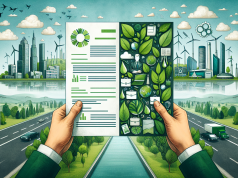Climate Change and the Financial Markets: The New Frontier for Working Professionals
In today’s rapidly evolving world, climate change is not just a looming environmental crisis. It has permeated the very fabric of financial markets, reshaping how assets are valued and investments are approached. As working professionals navigating this complex landscape, it’s crucial to understand how climate change is influencing financial markets and what it means for your career and investments.
Understanding the Climate-Driven Financial Shift
Financial markets are intrinsically linked to the physical world, and climate change has introduced a new dimension of risk and opportunity. Extreme weather events, regulatory shifts, and the transition to a low-carbon economy are transforming industries and altering investment paradigms. Companies are being increasingly scrutinized for their environmental impact, and investors are prioritizing sustainability like never before.
The shift is not merely theoretical. It is manifesting in tangible waysrising insurance costs due to catastrophic weather, fluctuating energy prices tied to regulatory changes, and the emergence of new industries centered on sustainability. For instance, renewable energy companies are seeing growth as fossil fuels face declining demand and tightening regulations.
The Power of ESG and Sustainability
Environmental, Social, and Governance (ESG) criteria have become central to investment decisions. ESG-driven investing focuses on companies that demonstrate responsible governance, positive social impact, and environmental stewardship. This trend is not just a moral imperative, but a financial necessity. Companies with strong ESG profiles often show resilience against climate-related risks, potentially offering better long-term returns.
For working professionals, this shift means that understanding ESG factors is no longer optionalit’s a fundamental part of financial literacy. Organizations across sectors are integrating sustainability into their business models, and professionals equipped with this knowledge are likely to thrive.
Opportunities in the Green Economy
The transition to a sustainable economy is generating unprecedented opportunities. Green technology and clean energy sectors are booming, driven by both consumer demand and government initiatives. Investment in these areas is expected to soar as more nations commit to net-zero emissions targets.
Professionals in finance, technology, and other fields should consider how their skills can be applied to or enhanced by the green economy. From advising on sustainable investments to innovating new solutions for reducing carbon footprints, the possibilities are vast and varied.
Navigating Uncertainty with Knowledge
While the challenges posed by climate change are significant, they also come with opportunities for those who are proactive and informed. Staying abreast of regulatory changes, understanding sector-specific impacts, and honing skills in sustainability can equip working professionals to navigate these uncertain times with confidence.
Moreover, as climate change continues to redefine the financial markets, collaboration across industries is becoming more crucial. Interdisciplinary approaches that blend financial acumen with environmental insights are leading the charge toward sustainable practices.
Conclusion: Embracing Change, Leading the Way
Climate change is reshaping financial markets and the professional landscape. For working professionals, this presents both a challenge and an opportunity. By embracing sustainability, investing in ESG knowledge, and leveraging new green opportunities, you can not only adapt to this new world but also lead the way toward a sustainable future.
In an era where climate change is at the forefront of global discourse, professionals who adapt and innovate will drive their careers and industries forward, ensuring not just survival, but success in the new climate economy.




























